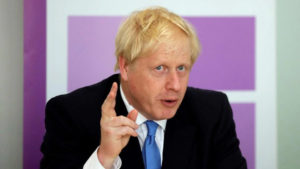Generally speaking, when a government is making emergency plans to safeguard water supplies, stockpile vital medicines, manage food shortages, prepare for civil unrest, suspend the legislature, and exploit arcane procedural devices to stay in power, things are not going great. For British Prime Minister Boris Johnson, it’s evidently all part of the plan.
Johnson came into office last month vowing to leave the European Union on Oct. 31, with or without a withdrawal agreement. Since then, his government has been shifting cash around, reassigning civil servants, launching “one of the biggest peacetime public information campaigns this country has seen,” and otherwise noisily affirming its pledge to pursue a no-deal Brexit if needed.
This apparent commitment to self-harm has a certain logic. It might induce the EU to offer more concessions to Johnson’s negotiators and produce a revised exit agreement that Parliament could assent to. Or it might help the prime minister secure a more coherent majority after an election. There’s also the remote possibility that he thinks it’s the right thing to do.
Whatever his purposes, a no-deal exit looks likelier by the day. This would, it bears repeating, be a calamity. It would lead to severe trade disruption, transport bottlenecks, rising prices, consumer shortages, failing businesses and in all likelihood a recession within months. Public finances would be ravaged and unemployment would surge. By the government’s own reckoning, the long-term costs could be immense.
Nor would such an exit achieve its stated goals. If the objective is a newly competitive “global Britain,” severing all ties with the country’s biggest trading partners overnight amid a simmering trade war and a looming recession probably isn’t ideal. Of the 36 trade deals that the U.K. is subject to within the EU, it has managed to roll over just 13, and many of them only partially — a picture that is unlikely to improve after a crash-out.
Far from offering a “clean break” from the EU, moreover, a no-deal exit would ensure years of hideous negotiations with no leverage and little hope of clawing back the benefits of membership. Any new agreement would likely need to be ratified by all of the EU’s 27 national parliaments, which may not be in a sympathetic mood after the U.K. has imposed so much needless mayhem.
What about “taking back control”? Among the only certainties of this process are that Britain’s influence will be diminished and its union weakened. Any eventual deal it reaches with the EU will leave it adhering to rules it has little power to shape. Scotland may demand independence and a referendum on a united Ireland may follow. Even Wales is asking impertinent questions. This isn’t control; it’s a leap into the unknown.
Partly because this strategy is so obviously illogical, the government has had a hard time getting people to believe its warnings. One survey found that only 14% of small businesses have made plans for no deal. Of the 245,000 British companies that trade exclusively with the EU, just 66,000 have so far completed the customs paperwork they’d need after a crash-out. They seem to be taking Johnson at his word that the chances of no deal are “a million to one” — and thereby increasing the cost and risk of the whole misadventure.
There’s still time, barely, to avoid the worst. Perhaps the opposition can revive itself. Perhaps Parliament can outmaneuver Johnson to block no deal. Although the chances of a second referendum recede by the hour, it remains the best — and most democratic — way out of this crisis.
One way or another, though, the contradictions lurking within the Brexit project will need to be resolved. And the costs are only going up.
(The story has been published from a wire fee


